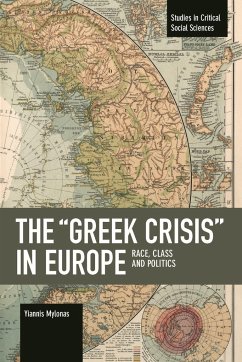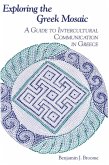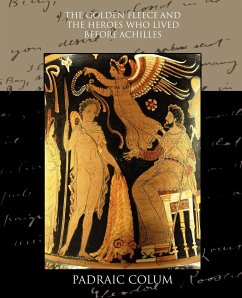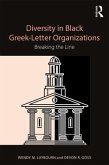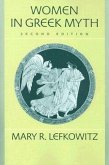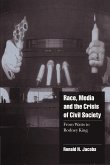- Broschiertes Buch
- Merkliste
- Auf die Merkliste
- Bewerten Bewerten
- Teilen
- Produkt teilen
- Produkterinnerung
- Produkterinnerung
This important study critically assesses the role of the mainstream media in shaping the politics and the popular understanding of the “Greek Crisis.”
Andere Kunden interessierten sich auch für
![Exploring the Greek Mosaic Exploring the Greek Mosaic]() Benjamin J BroomeExploring the Greek Mosaic28,99 €
Benjamin J BroomeExploring the Greek Mosaic28,99 €![The Golden Fleece and the Heroes who Lived Before Achilles The Golden Fleece and the Heroes who Lived Before Achilles]() Padraic ColumThe Golden Fleece and the Heroes who Lived Before Achilles25,99 €
Padraic ColumThe Golden Fleece and the Heroes who Lived Before Achilles25,99 €![Diversity in Black Greek Letter Organizations Diversity in Black Greek Letter Organizations]() Wendy Marie LaybournDiversity in Black Greek Letter Organizations59,99 €
Wendy Marie LaybournDiversity in Black Greek Letter Organizations59,99 €![Growing Up Greek in St. Louis Growing Up Greek in St. Louis]() Aphrodite Matsakis Ph. D.Growing Up Greek in St. Louis22,99 €
Aphrodite Matsakis Ph. D.Growing Up Greek in St. Louis22,99 €![Women in Greek Myth Women in Greek Myth]() Mary R LefkowitzWomen in Greek Myth34,99 €
Mary R LefkowitzWomen in Greek Myth34,99 €![Race, Media, and the Crisis of Civil Society Race, Media, and the Crisis of Civil Society]() Ronald N. JacobsRace, Media, and the Crisis of Civil Society35,99 €
Ronald N. JacobsRace, Media, and the Crisis of Civil Society35,99 €![Sexuality in Greek and Roman Society and Literature Sexuality in Greek and Roman Society and Literature]() Marguerite JohnsonSexuality in Greek and Roman Society and Literature40,99 €
Marguerite JohnsonSexuality in Greek and Roman Society and Literature40,99 €-
-
-
This important study critically assesses the role of the mainstream media in shaping the politics and the popular understanding of the “Greek Crisis.”
Hinweis: Dieser Artikel kann nur an eine deutsche Lieferadresse ausgeliefert werden.
Hinweis: Dieser Artikel kann nur an eine deutsche Lieferadresse ausgeliefert werden.
Produktdetails
- Produktdetails
- Verlag: Haymarket Books
- Seitenzahl: 259
- Erscheinungstermin: 4. August 2020
- Englisch
- Abmessung: 226mm x 150mm x 15mm
- Gewicht: 386g
- ISBN-13: 9781642591934
- ISBN-10: 1642591939
- Artikelnr.: 57837219
- Herstellerkennzeichnung
- Libri GmbH
- Europaallee 1
- 36244 Bad Hersfeld
- gpsr@libri.de
- Verlag: Haymarket Books
- Seitenzahl: 259
- Erscheinungstermin: 4. August 2020
- Englisch
- Abmessung: 226mm x 150mm x 15mm
- Gewicht: 386g
- ISBN-13: 9781642591934
- ISBN-10: 1642591939
- Artikelnr.: 57837219
- Herstellerkennzeichnung
- Libri GmbH
- Europaallee 1
- 36244 Bad Hersfeld
- gpsr@libri.de
Yiannis Mylonas, Ph.D (2009), University of Copenhagen, is Assistant Professor at the School of Media, National Research University Higher School of Economics, in Moscow.
Preface
Acknowledgements
List of Figures and Tables
1 Introduction: The Study of the Greek Economic Crisis in Europe through
the Media
1.1 Contextual Issues, Critical Political Economy and Cultural Studies
1.2 European Mass Media as the Empirical Material of the Study
1.2.1 A Brief Excursion on Liberalism and its Discontents
1.2.2 Greek, Danish and German Liberal Press
1.3 On Method: Thematic Analysis, Discourse Theory Analysis, Critical
Discourse Analysis
1.3.1 The Relevance of Discourse Theory
1.3.2 Critical Discourse Analysis Perspectives
1.4 The Analytical Pillars: Race, Class, Politics
1.4.1 On Race
1.4.1.1 Colonial Remainders: An “Eternal” Greece
1.4.2 On Class
1.4.2.1 Class Hegemony
1.4.3 Theorizing (Post)Politics
1.5 An Outline of the Chapters to Follow
2 Greek Crisis, Eurozone Crisis, Global Capitalist Crisis
2.1 Setting the “Greek Crisis” in Perspective
2.2 A Crisis of Capitalism and Capitalist Crises: A Brief Excursion to
Marxian Analyses
2.3 Crisis and Restructuring: Neoliberalism, Globalisation,
Financialisation
2.4 The Greek Crisis as a Symptom: Centre and Periphery Divisions
2.5 The EU, the Euro, and Austerity
2.6 Debt, Restructuring and Primary Accumulation
2.7 Concluding Remarks: Understanding Capitalism as Religion
3 The “Greek Crisis” in the Media: Hegemony, Spectacle and Propaganda
3.1 Media Aspects
3.2 Political Communication and the Public Sphere
3.3 Understanding Hegemony
3.3.1 The “Greek Crisis” in the Media: A Critical Overview
3.3.2 Hegemony, Propaganda and Biopolitics
3.4 Spectacular Dimensions of the “Greek Crisis”
3.5 Concluding Remarks: Interpellating and Disciplining the Working Class
4 A Cultural Failure: Reification, Orientalism, Nationalism
4.1 Introduction: (I)liberal Uses of Culture
4.2 Hegemonic Constructions of the (Occidental) Self and the (Oriental)
Other
4.3 Greece as a non/quasi-European Other
4.3.1 The Culturalisation of Greece and its Crisis
4.3.2 Greece as a Commodity: Media Rituals to Sustain Ideological Myths
4.3.3 Nationalism, Narcissism, Anxiety: Europe as a Panopticon and a
Benchmark
4.4 Concluding Remarks: The Occident, the Orient and the Liberal
Meritocracy Cult
5 Under a Middle-Class Gaze
5.1 Governing Inequality
5.2 The Middle-Class Gaze and the Media
5.3 “The Loser” as a Master Class Frame
5.4 The Greek Crisis and the Construction of “Losers”
5.4.1 The Irrational: Ignorant, Irresponsible, and Frustrated
5.4.2 The Immoral: Lazy, Profligate, Deceitful and Bankrupt
5.4.3 The Threatening Other: Resentment, Spite, and Loath
5.4.4 Idealising the Bourgeois; the Enduring Myths of a Peripheral Upper
Class
5.5 Concluding Remarks: Reaction, Diversion, Division
6 Exceptionalising the Crisis, Normalising Austerity
6.1 Technocratic Politics
6.2 Establishing the Crisis and Austerity Publicly in Depoliticised Terms
6.2.1 The Eurozone Crisis as an Apocalyptic Spectacle: Mediatised States
of Exception
6.2.2 Naturalizing Austerity; the Only Solution (Without an Alternative)
6.2.3 The “Extreme Center” and Constructions of “Realism”
6.3Concluding Remarks: Authoritarian Capitalism with Fascist Dispositions
7 Conclusions: Context, Politics, Negativity
7.1 Reinventing Critique, Reinventing Politics
7.2 Debunking Hegemony’s Crisis’ Myths
7.3 The Making of Regimes of Entitlement: Class is at the Heart of the
Matter
7.4 Capitalism is Apocalyptic: Politicizing the Crisis, Austerity, the
“Free Market”, and the (Capitalist) Economy
7.5 Negativity and Utopia
Bibliography
Index
Acknowledgements
List of Figures and Tables
1 Introduction: The Study of the Greek Economic Crisis in Europe through
the Media
1.1 Contextual Issues, Critical Political Economy and Cultural Studies
1.2 European Mass Media as the Empirical Material of the Study
1.2.1 A Brief Excursion on Liberalism and its Discontents
1.2.2 Greek, Danish and German Liberal Press
1.3 On Method: Thematic Analysis, Discourse Theory Analysis, Critical
Discourse Analysis
1.3.1 The Relevance of Discourse Theory
1.3.2 Critical Discourse Analysis Perspectives
1.4 The Analytical Pillars: Race, Class, Politics
1.4.1 On Race
1.4.1.1 Colonial Remainders: An “Eternal” Greece
1.4.2 On Class
1.4.2.1 Class Hegemony
1.4.3 Theorizing (Post)Politics
1.5 An Outline of the Chapters to Follow
2 Greek Crisis, Eurozone Crisis, Global Capitalist Crisis
2.1 Setting the “Greek Crisis” in Perspective
2.2 A Crisis of Capitalism and Capitalist Crises: A Brief Excursion to
Marxian Analyses
2.3 Crisis and Restructuring: Neoliberalism, Globalisation,
Financialisation
2.4 The Greek Crisis as a Symptom: Centre and Periphery Divisions
2.5 The EU, the Euro, and Austerity
2.6 Debt, Restructuring and Primary Accumulation
2.7 Concluding Remarks: Understanding Capitalism as Religion
3 The “Greek Crisis” in the Media: Hegemony, Spectacle and Propaganda
3.1 Media Aspects
3.2 Political Communication and the Public Sphere
3.3 Understanding Hegemony
3.3.1 The “Greek Crisis” in the Media: A Critical Overview
3.3.2 Hegemony, Propaganda and Biopolitics
3.4 Spectacular Dimensions of the “Greek Crisis”
3.5 Concluding Remarks: Interpellating and Disciplining the Working Class
4 A Cultural Failure: Reification, Orientalism, Nationalism
4.1 Introduction: (I)liberal Uses of Culture
4.2 Hegemonic Constructions of the (Occidental) Self and the (Oriental)
Other
4.3 Greece as a non/quasi-European Other
4.3.1 The Culturalisation of Greece and its Crisis
4.3.2 Greece as a Commodity: Media Rituals to Sustain Ideological Myths
4.3.3 Nationalism, Narcissism, Anxiety: Europe as a Panopticon and a
Benchmark
4.4 Concluding Remarks: The Occident, the Orient and the Liberal
Meritocracy Cult
5 Under a Middle-Class Gaze
5.1 Governing Inequality
5.2 The Middle-Class Gaze and the Media
5.3 “The Loser” as a Master Class Frame
5.4 The Greek Crisis and the Construction of “Losers”
5.4.1 The Irrational: Ignorant, Irresponsible, and Frustrated
5.4.2 The Immoral: Lazy, Profligate, Deceitful and Bankrupt
5.4.3 The Threatening Other: Resentment, Spite, and Loath
5.4.4 Idealising the Bourgeois; the Enduring Myths of a Peripheral Upper
Class
5.5 Concluding Remarks: Reaction, Diversion, Division
6 Exceptionalising the Crisis, Normalising Austerity
6.1 Technocratic Politics
6.2 Establishing the Crisis and Austerity Publicly in Depoliticised Terms
6.2.1 The Eurozone Crisis as an Apocalyptic Spectacle: Mediatised States
of Exception
6.2.2 Naturalizing Austerity; the Only Solution (Without an Alternative)
6.2.3 The “Extreme Center” and Constructions of “Realism”
6.3Concluding Remarks: Authoritarian Capitalism with Fascist Dispositions
7 Conclusions: Context, Politics, Negativity
7.1 Reinventing Critique, Reinventing Politics
7.2 Debunking Hegemony’s Crisis’ Myths
7.3 The Making of Regimes of Entitlement: Class is at the Heart of the
Matter
7.4 Capitalism is Apocalyptic: Politicizing the Crisis, Austerity, the
“Free Market”, and the (Capitalist) Economy
7.5 Negativity and Utopia
Bibliography
Index
Preface
Acknowledgements
List of Figures and Tables
1 Introduction: The Study of the Greek Economic Crisis in Europe through
the Media
1.1 Contextual Issues, Critical Political Economy and Cultural Studies
1.2 European Mass Media as the Empirical Material of the Study
1.2.1 A Brief Excursion on Liberalism and its Discontents
1.2.2 Greek, Danish and German Liberal Press
1.3 On Method: Thematic Analysis, Discourse Theory Analysis, Critical
Discourse Analysis
1.3.1 The Relevance of Discourse Theory
1.3.2 Critical Discourse Analysis Perspectives
1.4 The Analytical Pillars: Race, Class, Politics
1.4.1 On Race
1.4.1.1 Colonial Remainders: An “Eternal” Greece
1.4.2 On Class
1.4.2.1 Class Hegemony
1.4.3 Theorizing (Post)Politics
1.5 An Outline of the Chapters to Follow
2 Greek Crisis, Eurozone Crisis, Global Capitalist Crisis
2.1 Setting the “Greek Crisis” in Perspective
2.2 A Crisis of Capitalism and Capitalist Crises: A Brief Excursion to
Marxian Analyses
2.3 Crisis and Restructuring: Neoliberalism, Globalisation,
Financialisation
2.4 The Greek Crisis as a Symptom: Centre and Periphery Divisions
2.5 The EU, the Euro, and Austerity
2.6 Debt, Restructuring and Primary Accumulation
2.7 Concluding Remarks: Understanding Capitalism as Religion
3 The “Greek Crisis” in the Media: Hegemony, Spectacle and Propaganda
3.1 Media Aspects
3.2 Political Communication and the Public Sphere
3.3 Understanding Hegemony
3.3.1 The “Greek Crisis” in the Media: A Critical Overview
3.3.2 Hegemony, Propaganda and Biopolitics
3.4 Spectacular Dimensions of the “Greek Crisis”
3.5 Concluding Remarks: Interpellating and Disciplining the Working Class
4 A Cultural Failure: Reification, Orientalism, Nationalism
4.1 Introduction: (I)liberal Uses of Culture
4.2 Hegemonic Constructions of the (Occidental) Self and the (Oriental)
Other
4.3 Greece as a non/quasi-European Other
4.3.1 The Culturalisation of Greece and its Crisis
4.3.2 Greece as a Commodity: Media Rituals to Sustain Ideological Myths
4.3.3 Nationalism, Narcissism, Anxiety: Europe as a Panopticon and a
Benchmark
4.4 Concluding Remarks: The Occident, the Orient and the Liberal
Meritocracy Cult
5 Under a Middle-Class Gaze
5.1 Governing Inequality
5.2 The Middle-Class Gaze and the Media
5.3 “The Loser” as a Master Class Frame
5.4 The Greek Crisis and the Construction of “Losers”
5.4.1 The Irrational: Ignorant, Irresponsible, and Frustrated
5.4.2 The Immoral: Lazy, Profligate, Deceitful and Bankrupt
5.4.3 The Threatening Other: Resentment, Spite, and Loath
5.4.4 Idealising the Bourgeois; the Enduring Myths of a Peripheral Upper
Class
5.5 Concluding Remarks: Reaction, Diversion, Division
6 Exceptionalising the Crisis, Normalising Austerity
6.1 Technocratic Politics
6.2 Establishing the Crisis and Austerity Publicly in Depoliticised Terms
6.2.1 The Eurozone Crisis as an Apocalyptic Spectacle: Mediatised States
of Exception
6.2.2 Naturalizing Austerity; the Only Solution (Without an Alternative)
6.2.3 The “Extreme Center” and Constructions of “Realism”
6.3Concluding Remarks: Authoritarian Capitalism with Fascist Dispositions
7 Conclusions: Context, Politics, Negativity
7.1 Reinventing Critique, Reinventing Politics
7.2 Debunking Hegemony’s Crisis’ Myths
7.3 The Making of Regimes of Entitlement: Class is at the Heart of the
Matter
7.4 Capitalism is Apocalyptic: Politicizing the Crisis, Austerity, the
“Free Market”, and the (Capitalist) Economy
7.5 Negativity and Utopia
Bibliography
Index
Acknowledgements
List of Figures and Tables
1 Introduction: The Study of the Greek Economic Crisis in Europe through
the Media
1.1 Contextual Issues, Critical Political Economy and Cultural Studies
1.2 European Mass Media as the Empirical Material of the Study
1.2.1 A Brief Excursion on Liberalism and its Discontents
1.2.2 Greek, Danish and German Liberal Press
1.3 On Method: Thematic Analysis, Discourse Theory Analysis, Critical
Discourse Analysis
1.3.1 The Relevance of Discourse Theory
1.3.2 Critical Discourse Analysis Perspectives
1.4 The Analytical Pillars: Race, Class, Politics
1.4.1 On Race
1.4.1.1 Colonial Remainders: An “Eternal” Greece
1.4.2 On Class
1.4.2.1 Class Hegemony
1.4.3 Theorizing (Post)Politics
1.5 An Outline of the Chapters to Follow
2 Greek Crisis, Eurozone Crisis, Global Capitalist Crisis
2.1 Setting the “Greek Crisis” in Perspective
2.2 A Crisis of Capitalism and Capitalist Crises: A Brief Excursion to
Marxian Analyses
2.3 Crisis and Restructuring: Neoliberalism, Globalisation,
Financialisation
2.4 The Greek Crisis as a Symptom: Centre and Periphery Divisions
2.5 The EU, the Euro, and Austerity
2.6 Debt, Restructuring and Primary Accumulation
2.7 Concluding Remarks: Understanding Capitalism as Religion
3 The “Greek Crisis” in the Media: Hegemony, Spectacle and Propaganda
3.1 Media Aspects
3.2 Political Communication and the Public Sphere
3.3 Understanding Hegemony
3.3.1 The “Greek Crisis” in the Media: A Critical Overview
3.3.2 Hegemony, Propaganda and Biopolitics
3.4 Spectacular Dimensions of the “Greek Crisis”
3.5 Concluding Remarks: Interpellating and Disciplining the Working Class
4 A Cultural Failure: Reification, Orientalism, Nationalism
4.1 Introduction: (I)liberal Uses of Culture
4.2 Hegemonic Constructions of the (Occidental) Self and the (Oriental)
Other
4.3 Greece as a non/quasi-European Other
4.3.1 The Culturalisation of Greece and its Crisis
4.3.2 Greece as a Commodity: Media Rituals to Sustain Ideological Myths
4.3.3 Nationalism, Narcissism, Anxiety: Europe as a Panopticon and a
Benchmark
4.4 Concluding Remarks: The Occident, the Orient and the Liberal
Meritocracy Cult
5 Under a Middle-Class Gaze
5.1 Governing Inequality
5.2 The Middle-Class Gaze and the Media
5.3 “The Loser” as a Master Class Frame
5.4 The Greek Crisis and the Construction of “Losers”
5.4.1 The Irrational: Ignorant, Irresponsible, and Frustrated
5.4.2 The Immoral: Lazy, Profligate, Deceitful and Bankrupt
5.4.3 The Threatening Other: Resentment, Spite, and Loath
5.4.4 Idealising the Bourgeois; the Enduring Myths of a Peripheral Upper
Class
5.5 Concluding Remarks: Reaction, Diversion, Division
6 Exceptionalising the Crisis, Normalising Austerity
6.1 Technocratic Politics
6.2 Establishing the Crisis and Austerity Publicly in Depoliticised Terms
6.2.1 The Eurozone Crisis as an Apocalyptic Spectacle: Mediatised States
of Exception
6.2.2 Naturalizing Austerity; the Only Solution (Without an Alternative)
6.2.3 The “Extreme Center” and Constructions of “Realism”
6.3Concluding Remarks: Authoritarian Capitalism with Fascist Dispositions
7 Conclusions: Context, Politics, Negativity
7.1 Reinventing Critique, Reinventing Politics
7.2 Debunking Hegemony’s Crisis’ Myths
7.3 The Making of Regimes of Entitlement: Class is at the Heart of the
Matter
7.4 Capitalism is Apocalyptic: Politicizing the Crisis, Austerity, the
“Free Market”, and the (Capitalist) Economy
7.5 Negativity and Utopia
Bibliography
Index

